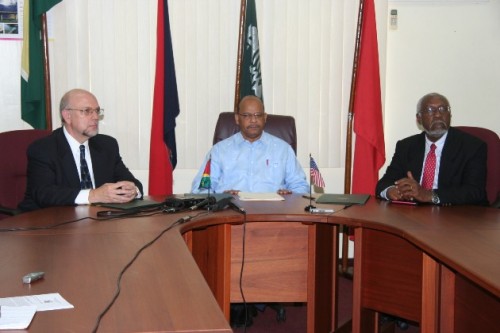Minister of Home Affairs, Clement Rohee condemned the current plague of gun crimes in the country and what he called a developing gun culture among criminals, as he inked an agreement with the United States yesterday to make the tracing of illegal firearms easier.
He said that law enforcement efforts to trace firearms seized locally have been frustrated because of the absence of the eTrace system, which he said Guyana did not sign onto earlier in the year because internal processes had not been completed.

Guyana signed onto the US initiative in partnership with the US Bureau of Alcohol, Tobacco, Firearms and Explosives (ATF) to facilitate the electronic tracing of illicit firearms under a system called eTrace. US Ambassador, John Jones and David Johnson of the ATF, signed the memorandum of understanding along with Rohee yesterday.
Rohee addressed the issue of the proliferation of illegal firearms in the country during the brief ceremony saying that a relatively large number of firearms have been recovered yearly. He said that an unacceptable number of murders and robberies have been committed by criminals armed with all types of firearms while lamenting the devastating impact of this.
“The young men especially, seem to believe that disputes must be settled by the use of a gun, they are in many instances brutal and discriminate in the use of the weapons, the state of affairs cannot be allowed to be continued”, Rohee said.
eTrace is a paperless firearm trace submission system that is accessible through a secure internet connection. It allows for submitting, retrieving, storing and querying firearms trace-related information, providing for the systematic tracing of firearms recovered from crime scenes.
The MOU, which was signed, establishes conditions of the partnership between the ATF and law enforcement authorities here regarding policy and procedures for the access and use of eTrace services.
Rohee said yesterday that the “highest quality officers” in the Guyana Police Force are to be trained to work on the new system as authorized eTrace users, when the necessary hardware and software are procured by the administration for it to be implemented. The US, through the ATF, is expected to negotiate procurement of the hardware and also assist with training.
He hailed the agreement as an important step in the collaborative efforts between the US and Guyana in tackling crime, adding that he is confident the new system will boost the work of local authorities. He said that government is gratified with the provision of the services.
Further, the Minister said that Guyana would now be part of a wider network of intelligence sharing and the dissemination of information in relation to illegal firearms. He stressed that the force will make maximum use of the eTrace system, saying also that they are willing to cooperate and collaborate with their counterparts in the US and other countries to suppress the scourge of crime.
Ambassador John Jones briefly commented that the agreement was highly anticipated, noting that it puts Guyana in a regional group of countries that will now have access to eTrace, and can participate in the fight against international crime and terrorism.
He said too, that the deal is part of an ongoing agreement that was initially established several months ago against the backdrop of cooperative efforts.
David Johnson, Chief of Firearm Tracing Branch of ATF, said that eTrace is free of cost to access.
He said that the system will help them to identify which illegal weapons here came from the US. Additionally, he said that they are committed to helping anyway they can to reduce the numbers of illegal weapons out there.
A press release from the US Embassy said yesterday that more than 30,000 crime-gun trace requests were processed by the ATF, including traces from 58 countries.
Ten countries in the region signed the agreement with the United States in March at a ceremony in Barbados. Signatories included Barbados; St. Kitts and Nevis; St. Lucia; Antigua; St. Vincent and the Grenadines; Dominica and Grenada; Aruba, Curacao and Anguilla.
In 2007 the US and Caricom member states, drawing on their mutual vision of inter-American security had agreed to improve information sharing on entities and individuals involved in illicit trafficking, and the routes they use to traffic arms, and to promote the tracing of firearms recovered in connection with illicit activities in order to provide investigative leads.
Further, countries in the hemisphere were encouraged to join in the effort with the US consistent with the joint December 2007 Caricom-US Initiative on Combating Illicit Trafficking in Small Arms and Light Weapons and Ammunition.





